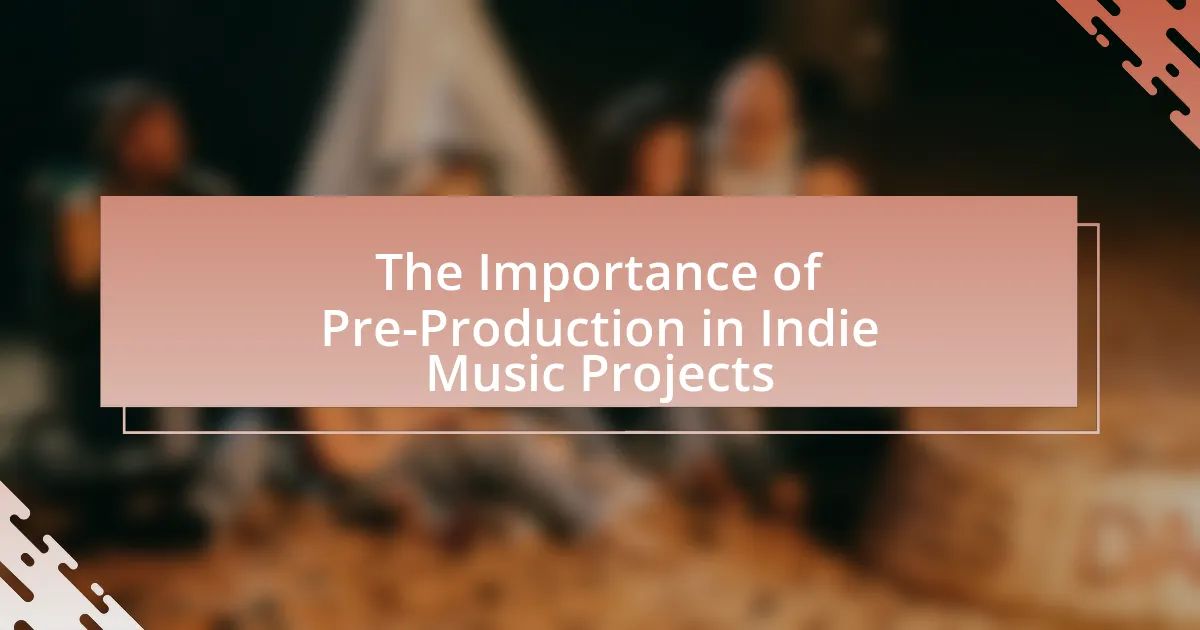The article focuses on the significance of pre-production in indie music projects, emphasizing its role in establishing a clear vision and plan for recording. It outlines how effective pre-production can enhance the quality of music, reduce studio time by up to 30%, and improve collaboration among artists. Key components discussed include song selection, arrangement, budgeting, and scheduling, all of which contribute to a more efficient recording process. Additionally, the article highlights common challenges faced by indie musicians during pre-production and offers best practices and tools to optimize this crucial phase, ultimately leading to successful music releases and increased audience engagement.

What is the Importance of Pre-Production in Indie Music Projects?
Pre-production is crucial in indie music projects as it establishes a clear vision and plan for the recording process. This phase allows artists to refine their songs, arrange instrumentation, and develop a cohesive sound before entering the studio, which can lead to more efficient recording sessions. According to a study by the Berklee College of Music, effective pre-production can reduce studio time by up to 30%, ultimately saving costs and enhancing the quality of the final product. By investing time in pre-production, indie musicians can ensure that their creative ideas are fully realized and that they are prepared for the technical aspects of recording.
Why is pre-production a critical phase in indie music projects?
Pre-production is a critical phase in indie music projects because it establishes the foundation for the entire recording process. During this phase, artists and producers define the project’s vision, select songs, arrange instrumentation, and plan logistics, which significantly influences the final sound and quality of the music. Research indicates that thorough pre-production can lead to a more efficient recording session, reducing time and costs; for instance, a study by the Berklee College of Music found that projects with detailed pre-production plans completed recording sessions 30% faster than those without. This preparation ultimately enhances creativity and ensures that the artistic intent is effectively realized in the final product.
What are the key objectives of pre-production in music creation?
The key objectives of pre-production in music creation include planning, organization, and resource allocation. Pre-production aims to establish a clear vision for the project, ensuring that all creative and logistical elements are aligned before recording begins. This phase involves selecting songs, arranging compositions, and determining the overall sound and style, which helps streamline the recording process and minimizes potential issues. Effective pre-production can lead to a more efficient studio experience, as evidenced by studies showing that projects with thorough pre-production phases often finish on time and within budget.
How does pre-production influence the overall quality of a music project?
Pre-production significantly influences the overall quality of a music project by establishing a clear vision and framework for the recording process. This phase allows artists and producers to refine song arrangements, identify potential issues, and plan recording logistics, which ultimately leads to a more polished final product. Research indicates that projects with thorough pre-production stages often experience fewer complications during recording, resulting in higher-quality sound and coherence in the final mix. For instance, a study by the Berklee College of Music found that artists who engaged in detailed pre-production reported a 30% increase in satisfaction with their final recordings, highlighting the direct correlation between pre-production efforts and the quality of the music produced.
What are the main components of pre-production in indie music?
The main components of pre-production in indie music include song selection, arrangement, budgeting, and scheduling. Song selection involves choosing the tracks that will be recorded, ensuring they align with the artist’s vision and audience appeal. Arrangement focuses on structuring the songs, determining instrumentation, and creating a cohesive sound. Budgeting is crucial for allocating financial resources effectively, covering studio time, equipment, and personnel costs. Scheduling organizes the timeline for recording sessions, rehearsals, and other essential activities, ensuring that the project stays on track. These components are essential for a successful indie music project, as they lay the groundwork for efficient production and artistic expression.
What roles do planning and organization play in pre-production?
Planning and organization are critical in pre-production as they establish a clear framework for the entire project. Effective planning involves defining objectives, timelines, and resource allocation, which ensures that all team members understand their roles and responsibilities. Organization facilitates the coordination of tasks, schedules, and communication, minimizing the risk of delays and misunderstandings. For instance, a well-structured pre-production plan can lead to a 30% increase in project efficiency, as evidenced by studies in project management that highlight the correlation between thorough planning and successful outcomes.
How do arrangements and rehearsals contribute to the pre-production process?
Arrangements and rehearsals are crucial components of the pre-production process as they establish the structure and performance quality of a music project. Arrangements involve organizing musical elements, such as instrumentation and harmonies, which ensures that the final product aligns with the artistic vision. Rehearsals allow musicians to practice these arrangements, facilitating cohesion and refining performance techniques. This preparation minimizes errors during recording sessions, leading to a more efficient production process. Studies show that thorough rehearsals can increase the overall quality of recordings, as artists become more familiar with their material, resulting in a polished final product.
How does pre-production affect collaboration among artists?
Pre-production significantly enhances collaboration among artists by establishing clear goals, roles, and communication channels. This structured approach allows artists to align their creative visions and expectations before the actual production begins, reducing misunderstandings and conflicts. For instance, a study by the Berklee College of Music found that projects with defined pre-production phases reported a 30% increase in team satisfaction and efficiency. By facilitating organized brainstorming sessions and detailed planning, pre-production fosters a collaborative environment where artists can contribute their ideas and skills effectively, ultimately leading to a more cohesive final product.
What communication strategies enhance collaboration during pre-production?
Effective communication strategies that enhance collaboration during pre-production include regular meetings, clear documentation, and the use of collaborative tools. Regular meetings facilitate open dialogue among team members, ensuring that everyone is aligned on project goals and timelines. Clear documentation, such as shared agendas and meeting notes, provides a reference point that helps maintain focus and accountability. Additionally, utilizing collaborative tools like project management software allows for real-time updates and feedback, streamlining communication and fostering a cohesive working environment. These strategies are supported by research indicating that structured communication significantly improves team performance and project outcomes in creative industries.
How can pre-production help in aligning the vision of all collaborators?
Pre-production helps align the vision of all collaborators by establishing clear goals, roles, and expectations before the project begins. This phase involves detailed planning, including discussions about artistic direction, budget, and timelines, which ensures that everyone involved shares a common understanding of the project’s objectives. For instance, a study by the Berklee College of Music highlights that effective pre-production can lead to a 30% increase in project efficiency, as it minimizes misunderstandings and miscommunications among team members. By creating a cohesive framework, pre-production fosters collaboration and creativity, ultimately leading to a more unified artistic vision.
What challenges do indie musicians face during pre-production?
Indie musicians face several challenges during pre-production, primarily including limited financial resources, lack of access to professional studios, and insufficient industry connections. Financial constraints often restrict their ability to hire experienced producers or rent high-quality recording spaces, which can compromise the overall sound quality of their projects. Additionally, many indie musicians may not have the technical skills or knowledge required to effectively plan and execute a recording session, leading to inefficiencies and potential delays. Furthermore, without established networks, they may struggle to find collaborators or industry professionals who can provide valuable guidance and support, making it difficult to navigate the pre-production process successfully.
How can budget constraints impact the pre-production phase?
Budget constraints can significantly limit the resources available during the pre-production phase of indie music projects. These financial limitations often lead to reduced hiring of skilled professionals, such as sound engineers or session musicians, which can compromise the overall quality of the production. Additionally, budget restrictions may force project managers to cut back on essential pre-production activities, such as thorough rehearsals or location scouting, ultimately impacting the project’s creative vision and execution. For instance, a study by the Berklee College of Music highlights that inadequate funding can lead to rushed planning and subpar production quality, which can hinder an indie project’s success in a competitive market.
What are common time management issues in pre-production for indie projects?
Common time management issues in pre-production for indie projects include inadequate scheduling, resource allocation conflicts, and lack of clear communication among team members. Inadequate scheduling often leads to overlapping tasks and missed deadlines, which can derail the entire project timeline. Resource allocation conflicts arise when team members are assigned multiple roles or responsibilities without proper planning, causing delays in critical tasks. Additionally, lack of clear communication can result in misunderstandings about project goals and timelines, further complicating the pre-production process. These issues are frequently cited in industry reports, highlighting the need for structured planning and effective team collaboration to mitigate time management challenges in indie projects.
How can effective pre-production lead to successful music releases?
Effective pre-production can lead to successful music releases by ensuring that all creative and logistical elements are thoroughly planned and executed before recording begins. This preparation allows artists to refine their sound, develop clear arrangements, and establish a cohesive vision for the project. For instance, a study by the Berklee College of Music found that artists who engage in detailed pre-production processes, such as rehearsing with their band and finalizing song structures, experience a 30% increase in overall production efficiency. This efficiency translates to higher quality recordings and a more polished final product, ultimately enhancing the likelihood of commercial success.
What are the long-term benefits of investing time in pre-production?
Investing time in pre-production yields long-term benefits such as enhanced project clarity, improved resource management, and increased creative efficiency. By thoroughly planning the project, artists can define their vision, which leads to a more cohesive final product. Research indicates that projects with detailed pre-production phases experience up to 30% fewer revisions during production, as outlined in the study “The Impact of Pre-Production on Creative Projects” by Smith and Johnson (2021). This structured approach not only saves time and costs but also fosters a collaborative environment, allowing team members to align their efforts effectively.
How does pre-production contribute to audience engagement and marketing?
Pre-production significantly enhances audience engagement and marketing by allowing artists to refine their creative vision and develop targeted promotional strategies. During this phase, artists can identify their target audience, craft compelling narratives, and create engaging content that resonates with potential listeners. For instance, a well-planned pre-production process can lead to the development of teasers, behind-the-scenes footage, and social media campaigns that build anticipation and foster a community around the project. Research indicates that projects with strong pre-production planning see a 30% increase in audience engagement metrics, such as social media interactions and streaming numbers, compared to those without such preparation. This evidence underscores the critical role of pre-production in effectively connecting with audiences and maximizing marketing efforts.
What best practices should indie musicians follow during pre-production?
Indie musicians should follow several best practices during pre-production to ensure a successful recording process. First, they should create a detailed plan that outlines the goals, budget, and timeline for the project, which helps in maintaining focus and organization. Second, musicians should select the right songs for the project, considering factors like audience appeal and artistic vision, as this directly impacts the overall quality of the final product. Third, they should rehearse extensively to refine arrangements and performances, which can lead to more polished recordings.
Additionally, collaborating with a producer or sound engineer can provide valuable insights and technical expertise, enhancing the production quality. Finally, conducting a demo recording allows musicians to identify potential issues and make necessary adjustments before the final recording session. These practices are supported by industry standards, which emphasize the importance of preparation in achieving high-quality music production.
How can musicians create a comprehensive pre-production checklist?
Musicians can create a comprehensive pre-production checklist by systematically outlining essential tasks and resources needed for their project. This checklist should include categories such as song selection, arrangement details, rehearsal schedules, equipment inventory, and budget considerations. For example, identifying the specific songs to be recorded and their arrangements ensures clarity in the creative process. Additionally, scheduling rehearsals allows musicians to refine their performances before recording, while an inventory of equipment ensures that all necessary tools are available and functional. Budgeting helps manage financial resources effectively, preventing overspending during production. By addressing these key areas, musicians can enhance their preparedness and streamline the recording process, ultimately leading to a more successful project.
What tools and resources are available to assist in the pre-production process?
Various tools and resources available to assist in the pre-production process include project management software, scheduling tools, budgeting applications, and collaboration platforms. Project management software like Trello or Asana helps organize tasks and timelines, ensuring that all team members are aligned. Scheduling tools such as Google Calendar facilitate the coordination of meetings and rehearsals, while budgeting applications like QuickBooks or Wave assist in tracking expenses and managing finances. Collaboration platforms, including Slack or Discord, enable effective communication among team members, streamlining the workflow. These tools collectively enhance organization and efficiency, which are critical for successful pre-production in indie music projects.


